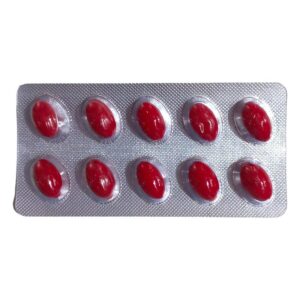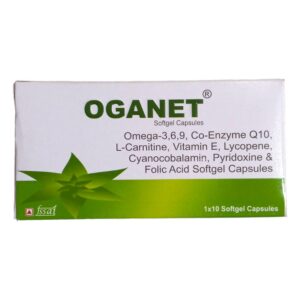OMEGA 3 FA + VITAMIN E ACETATE + SOFTGEL CAPSULES + UBIDECARENONE (COENZYME Q10)
Omega 3 Fa: Drug: Omega 3 Fatty Acids (Omega 3 FA)
Use: Omega 3 Fatty Acids are commonly used as a dietary supplement to support overall health and well-being. They have been found to have numerous benefits, particularly in reducing the risk of cardiovascular disease, improving brain function, and reducing inflammation.
Mechanism of Action: Omega 3 fatty acids are a type of polyunsaturated fats that are essential for the body. The primary active components in Omega 3 FA are eicosapentaenoic acid (EPA) and docosahexaenoic acid (DHA). These fatty acids play crucial roles in maintaining the structure and function of cellular membranes, improving heart function, reducing inflammation, and supporting brain health.
Dose: The recommended daily dose of Omega 3 FA varies depending on the specific formulation and indication. Generally, a daily intake of 1-4 grams of combined EPA and DHA is recommended for overall health benefits. However, specific conditions may require higher or lower doses. It is important to follow the dosage instructions provided by the specific brand or consult with a healthcare professional for personalized dosing recommendations.
Side Effects: Omega 3 FA supplements are generally considered safe and well-tolerated when taken within recommended doses. However, some individuals may experience mild side effects such as fishy aftertaste, burping, indigestion, or diarrhea. High doses of Omega 3 FA may increase the risk of bleeding, therefore caution should be exercised in individuals on blood-thinning medications or those with bleeding disorders. It is always advisable to consult with a healthcare professional before starting any new dietary supplement, especially if you have any underlying medical conditions or are taking medications.
Vitamin E Acetate: Vitamin E Acetate is the ester form of Vitamin E, a fat-soluble vitamin known for its antioxidant properties. It is commonly used as a dietary supplement and is available in various forms, including capsules, tablets, and oils.
Vitamin E Acetate is primarily used for its beneficial effects on cellular health and immune function. It helps protect cell membranes from oxidative damage caused by free radicals and may also have anti-inflammatory properties. Additionally, it plays a role in maintaining healthy skin, hair, and nails.
The recommended daily dose of Vitamin E Acetate varies depending on age, gender, and health status. For adults, the daily recommended dietary allowance is typically around 15 mg (22.4 IU) per day. However, higher doses may be recommended for certain medical conditions or as directed by a healthcare professional.
Vitamin E Acetate is generally considered safe when taken within recommended doses. However, excessive intake of Vitamin E, especially in supplement form, can increase the risk of bleeding, particularly in individuals who are on blood-thinning medications. Other potential side effects may include nausea, diarrhea, stomach cramps, fatigue, and weakness.
It is important to note that Vitamin E Acetate is not a substitute for a balanced diet and should not be used as a substitute for prescribed medications. If you are considering taking Vitamin E Acetate as a supplement, it is always advisable to consult with a healthcare professional to determine if it is suitable for your individual needs and to ensure it does not interfere with any existing medications or medical conditions.
Softgel Capsules: Softgel capsules are a type of oral medication delivery system that is commonly used to encapsulate liquid, semi-solid, or solid drugs. The softgel casing is made of a gelatin-based material that is easy to swallow and quickly dissolves in the stomach, releasing the drug for absorption.
Use:
Softgel capsules are used to deliver a wide range of drugs, including prescription medicines, dietary supplements, vitamins, and herbal products. They are particularly popular for medications that require oily or liquid formulations that would be difficult to administer in other forms, such as tablets or powders.
Mechanism of Action:
The mechanism of action of softgel capsules depends on the active drug inside. Each drug has its own specific mechanism to exert its therapeutic effect on the body. Softgel capsules generally facilitate the dissolution and absorption of the drug by protecting it from degradation in the acidic environment of the stomach and enhancing its bioavailability.
Dose:
The dosage of softgel capsules varies depending on the specific medication being delivered. The recommended dose is usually provided by the healthcare professional or indicated on the product packaging. It is important to follow the prescribed dose and instructions for use to ensure maximum effectiveness and minimize the risk of side effects.
Side Effects:
Softgel capsules themselves do not cause any specific side effects since they are only a delivery system for the drug. However, the active drug contained within the softgel capsule may have its own side effects. These side effects can vary widely depending on the drug, dosage, and individual patient factors. Common side effects may include gastrointestinal issues (such as nausea, vomiting, or diarrhea), allergic reactions, dizziness, drowsiness, or changes in blood pressure. It is important to consult a healthcare professional or refer to the medication’s package insert for specific information about potential side effects.
Ubidecarenone (coenzyme Q10): Ubidecarenone, also known as coenzyme Q10 (CoQ10), is a naturally occurring compound found in every cell of the human body. It is essential for producing energy and is involved in numerous biological processes. CoQ10 can be obtained through diet or synthesized by the body.
Coenzyme Q10 is commonly used as a dietary supplement to support overall health and well-being, as well as to treat certain medical conditions. It is believed to have antioxidant properties, meaning it can help protect cells from damage caused by harmful free radicals. Additionally, CoQ10 plays a role in cellular energy production, making it important for the functioning of organs with high energy demands, such as the heart, liver, and kidneys.
The primary mechanism of action of CoQ10 is its involvement in the electron transport chain, a process in which energy is generated within cells. It functions as a coenzyme, assisting in the conversion of food into adenosine triphosphate (ATP), the main source of cellular energy. CoQ10 also acts as an antioxidant, neutralizing free radicals and reducing oxidative stress in the body.
The appropriate dosage of CoQ10 can vary depending on the individual’s age, health condition, and purpose of use. Generally, a daily dose of 100-200 mg is considered safe for adults. However, it is crucial to consult a healthcare professional before starting or changing any dosage. CoQ10 supplements are available in various forms, including capsules, tablets, and softgels.
While CoQ10 is generally well tolerated and considered safe, some individuals may experience mild side effects such as upset stomach, nausea, diarrhea, or allergic reactions. These side effects are usually rare and occur at high doses.
It is important to note that CoQ10 supplements may interact with certain medications, such as blood thinners, chemotherapy drugs, and some cholesterol-lowering medications (statins). Therefore, it is vital to inform the healthcare provider about all medications, supplements, and medical conditions before starting CoQ10 supplementation.
Overall, Coenzyme Q10 (CoQ10) is a naturally occurring compound that plays a crucial role in cellular energy production and has antioxidant properties. It is widely used as a dietary supplement to support overall health and treat certain conditions. However, it is important to consult with a healthcare professional before starting any supplement regimen.


